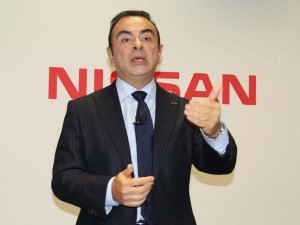Nissan expects to double sales of its Leaf battery-electric vehicle in 2012, CEO Carlos Ghosn said during a meeting with members of the automotive media at the North American International Auto Show.
The make sold just 9,674 of the cars last year, its first entry into the nascent field of electrification. But Ghosn downplayed the concerns expressed by many industry analysts, some going so far as to suggest battery propulsion has already proven to be a failure.
“The only reason we couldn’t sell more is because we couldn’t build more,” the Brazilian-born executive emphasized, suggesting the biggest issue was a shortage of batteries, and adding that “We’re expecting in 2012 to double that number.”
He better hope so considering the commitment to battery power being made by Nissan and its French alliance partner Renault. Globally, they plan to have production capacity in place for 400,000 battery cars annually by 2015, with a sizable chunk of that in a new facility Nissan is building alongside its existing assembly plant in Smyrna, Tennessee.
What should help, stressed Ghosn, is the expansion from seven initial launch markets to all 50 states by the end of 2012. If anything, he said he believes there is “pent-up demand for electric cars which is today not being recognized.”
While Nissan hopes to make a serious business case for small battery vehicles, it also remains hopeful of improving its luck at the other end of the automotive spectrum. It has so far faltered with the seven-year-old full-size Titan pickup. Last year, the big truck saw another 6.1% sales decline, generating volumes of just 21,994, or barely 4% of the demand for Ford’s best-selling F-Series pickup.
Nissan had hoped to reduce its cost of entry by sourcing a Titan replacement from Chrysler, sharing the same platform as the U.S. maker’s Ram pickup. But that project has been scrubbed. While there had been some concerns Nissan might abandon the segment, Ghosn insisted that was not in the cards.
“We are going to replace it,” he asserted, adding that, “We are going to present in every segment in the market in the United States.”
According to well-placed company sources, the home-grown replacement for the Titan will likely reach market by 2014.
While the Chrysler project fizzled, Ghosn is putting significant stock in joint ventures, both with Nissan’s alliance partner, Renault, and with Germany’s Daimler AG. The three firms established a pragmatic partnership in April 2010 that has grown significantly beyond initial expectations. Just this week, the latest project was announced, calling for Daimler and Nissan to jointly build engines at a plant in Decherd, Tennessee. Those 4-cylinder powerplants will show up in both Infiniti and Mercedes-Benz products starting in 2014.
Though he once suggested he might like a third partner in the Renault-Nissan Alliance, Ghosn said that isn’t a driving goal anymore. On the other hand, he said it would be wise to “expect to see more projects with Daimler.
Of the Big Three Japanese makers only Nissan was able to avoid losing ground in the key U.S. market last year as a result of the March 11 Japanese earthquake and tsunami. Sales rose 15% and Ghosn said he is even more optimistic about 2011, noting the upcoming launch of several key products – starting with the Pathfinder at the Detroit Auto Show and following with updates of the midsize Sentra and Altima sedans.
“We think the next Altima will be a strong contender competing for the number-one spot” in the midsize segment, said Ghosn.

